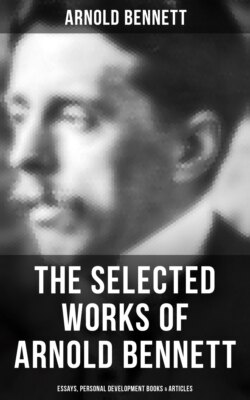Читать книгу The Selected Works of Arnold Bennett: Essays, Personal Development Books & Articles - Arnold Bennett - Страница 92
На сайте Литреса книга снята с продажи.
Longer Plays.
ОглавлениеWhen writing a full-sized play the aspirant should do a full description of the plot (“scenario”) and write the first act, and should then submit this to a manager or to several managers. The manager will have before him quite sufficient material to enable him to judge whether he is likely to approve of the completed play. What managers think of first is the “idea” of the play. They do not, customarily, regard a play as an organic whole consisting of many equally important parts, but as a sort of nut with a kernel in it; that kernel is the “idea”—the salient situation. They are fascinated, not byplays, but by “ideas” for plays, by single situations, by ingenious groupings. If there is an attractive “idea” in your first act or scenario, the manager may encourage you vocally to proceed. (It is advisable to see managers the moment they evince the slightest interest in your achievements. They can almost always be seen without undue formalities, and they can always be seen by the diplomatist who is determined to see them.) If there is an exceptionally attractive idea in your first act or scenario, the manager may probably be induced to encourage you to proceed by something more valuable than words. A not unusual course is for the manager to pay £ 100 down on the playwright undertaking to finish the play by an agreed date, and to give the manager the option of buying die dramatic rights on agreed terms. If the manager refuses the play on its completion, he loses the £ 100 which he has already paid, and the playwright is £100 in pocket, with a play to sell. If the manager accepts the play on its completion, he usually pays a second £ 100 to seal the bargain, and the dramatic rights become his on condition that he produces the piece within an agreed period—say two years.
No manager will enter into an absolute contract to produce a play (with possible exceptions in the case of the work of supereminent playwrights). A manager will only enter into a contract either to produce within an agreed period, or, in default, to forfeit all his rights and all sums already paid. If he produces, all sums already paid are reckoned as on account of royalties. It is important that the aspirant should remember this. A contract for production does not infallibly mean production. And in fact all managers enter into contracts about plays which they never produce. Forfeit money on non-produced plays is a regular item of managerial expenditure.
The usual royalties on a three or four act piece are as follows;—Taking the West End gross weekly receipts, week by week, the author is paid 5 per cent, on the first £750, 71/2 per cent, on the next £250, and 10 percent on everything over £1000. Provincial rights are specially arranged for. Foreign rights are either specially arranged for or are reserved by the author. A West End theatre of average spaciousness will hold £250 per night when it is full. At the rate of six nights and one matinee per week this means a grand weekly total of possible receipts of £1750. On £1750 the author’s fees would be £131, 5s. In practice, however, a theatre is seldom or never full for a week together. Some West End theatres can be run on £500 a week, or perhaps less. The author’s fees on £500 would only be £25. But even at their least brilliant the profits of successful playwriting are very large in comparison with the profits of successful fiction. Sums of five, ten, and twenty thousand pounds are made from a single play in London alone. And a London success often means an American success, and an American success means profits to the English author not much less than the London profits.
In conclusion I would say that, although the supply of marketable plays is not equal to the demand, although successful managers are ready to buy plays from outsiders, although successful managers actually do buy plays from outsiders, the chances of a beginner getting a long play produced for a run in a first-rate West End theatre are extremely small.
